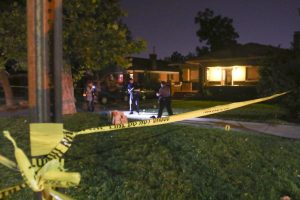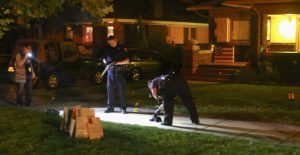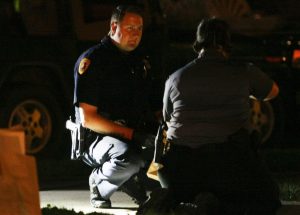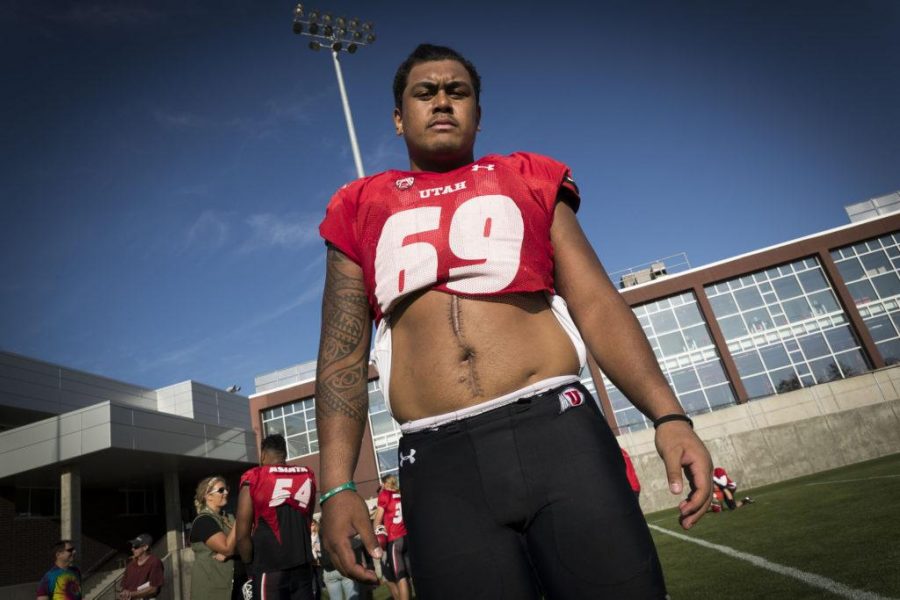One year ago
On Sept. 12, 2015, members of the Utah football team were attending a house party near campus. They were celebrating after beating Utah State earlier that day, and they were just looking to blow off some steam, take a break and relax, but the night had other plans.
People were drinking and having fun — it was just another average house party. A few uninvited guests showed up and started causing trouble, prompting the host to ask them to leave, but she was having a bit of trouble actually getting them to leave.
Lo Falemaka had barely sat down on the porch when he heard what was going on inside. He immediately went to go help the host, a friend of his, and Falemaka told them “to leave and that if they don’t it’s going to get nasty.”
So they left — but the unwanted house guests had other plans.
The group of guys returned with even more people than they had before, and according to Falemaka, they started throwing up gang signs and started throwing other items at the house.
“[I] went back out there, and I tried to fight one of them and got shot,” Falemaka said.
Around 11:53 p.m., a 911 call was made, shots had been fired on 310 S. 1300 E. — and two members of the Utah football team had taken the hits.

A mother’s worst nightmare
“My knees buckled — I couldn’t even walk — I was in a lot of pain,” Falemaka said.
When Falemaka was hit, things started to become a blur. People have told him that his teammate and good friend Siale Fakailoatonga jumped over the balcony to rush to his side to apply pressure to the wounded area, nearly spraining his ankle. Although he didn’t witness that firsthand, what Falemaka does remember is this: he told the surrounding people to call his mother.
“As soon as she heard, she thought I was dead,” Falemaka said. “She thought I was gone, and she just broke down.”
When she got to the hospital, though, and realized her son would be okay, she calmed down, but only for awhile.
Falemaka’s mother arguably went into mama-bear mode following her son’s stint in the hospital. However, Falemaka is thankful to have had her by his side throughout the entire recovery process.
“I couldn’t go out for a walk unless she was right there next to me, right by my side,” Falemaka said.
The storm that followed
Marcel Manalo, who was caught in the crossfire, was hospitalized for a single day, and he even went back to attending classes that same week. However, Falemaka didn’t have the same luck.
Falemaka was in the hospital for nearly two weeks — the two longest weeks in his life. He couldn’t sleep, he couldn’t think clearly because of it, and he was just waiting for the day the doctors would give him the okay to leave the hospital.
“It was brutal,” Falemaka said. “It was the worst two weeks of my life. Couldn’t sleep, just in pain, but I had a lot of support. My teammates and my family all filled up the hospital floor.”
Both Manalo and Falemaka still have the bullets lodged in their bodies.
It’s a constant reminder of what the two have been through, but it’s also a reminder of what they have to live for, one of course being a college football career. Falemaka is eager to prove his worth on the field. He’s currently listed as the backup center, and he’s confident that if his name does get called up, he’ll be able to live up to both his own expectations and his coaches’ expectations.
For better or for worse, the two are thankful to have someone who knows more or less what they went through. However, a bullet didn’t solidify a bond beyond that.

Closer friends
Yes the two were both shot — both bullets from the same gun, from the same hand — but they aren’t necessarily the greatest of friends. They have their own friend groups, their own support systems, and they like it that way.
Often times their friend groups cross over, and they sympathize with one another when occasionally one of the two doesn’t really want to go out to a party. Considering the two didn’t know each other too well beforehand, they have grown a lot closer.
But again, the duo didn’t really talk much before and according to Falemaka, it’s more of the same now.
“We’re not all of a sudden best friends, but we’re still boys,” Falemaka said.
They do have a few other things in common though — and that’s the support they receive from their head coach.
A coach’s support
When head coach Kyle Whittingham found out about the shooting, he immediately rushed to the hospital to be by Falemaka and Manalo’s side, in fact, the entire team did.
Members of the Utah football team flooded the floor the two were on, because time and time again, the team will remind everyone how much more of a family it is rather than just any ordinary team. They’re brothers, and they stick together — on and off the field — and Whittingham may as well be the father figure, referring to his players as sons on certain occasions.
Whittingham has seen both Falemaka and Manalo work hard to push past this event. They want to make a name for themselves in some other facet helping the team — they don’t just want people to remember them as the Utah football players who were shot.
“They both have put it behind them,” Whittingham said. “It was obviously a very difficult situation. They’re both mentally tough kids, and they’re both back 100 percent, and we’re glad to have them back with us.”

The road ahead
The men involved in the shooting were never found — they could never be arrested.
While this could be frustrating for Falemaka and Manalo, Manalo is again focused on the future. Manalo is not too concerned on any “What ifs,” he’s taking things day by day. He’s not worries about catching the guy who hospitalized him —he’s a big believer in karma.
Manalo wants to become a better a football player, a better teammate and a better person.
“Where I come from, I’m very lucky to get out,” Manalo said. “I gotta make a name for myself, so I’m going to continue to strive until I do so.”
k.brenneisen@dailyutahchronicle.com
@kbrenneisen


